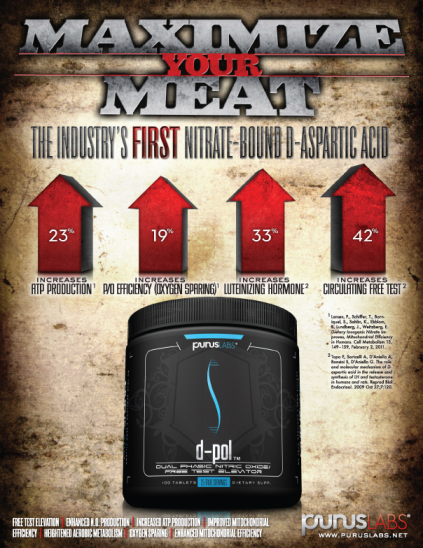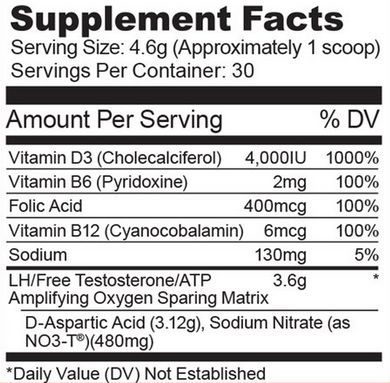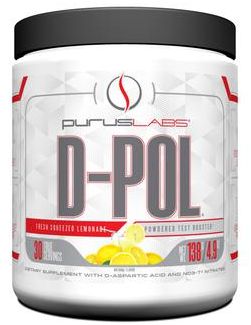D-POL 30 SERV
El potenciador del anabolismo más potente. Aumenta la testosterona y potencia el óxido nítrico.

Bienvenido, Entrar/Registrarse
El potenciador del anabolismo más potente. Aumenta la testosterona y potencia el óxido nítrico.
All-Natural Anabolism
Dual-Phasic Free Test/Nitric Elevator
Precio recomendado: 59.95 €
Marca: Purus Labs
Radical test booster/nitrate complex
- Increase ATP Production.
- Increased Oxygen Sparring Efficiency.
- Increased Lutenizing Hormone Activation.
- Increased Circulation of Free Test.
- Increase in strength and lean muscle mass.

D-aspartic acid
Considering the sound evidence for a role of DAA in testosterone synthesis, a human study was recently performed to assess the effectiveness of oral DAA supplementation with regards to testosterone elevation (Topo et al., 2009). Subjects included 43 men (27-37 yrs), 20 who received a placebo and 23 who received a DAA supplement (3.12 grams of DAA combined with B-vitamins—the same dosage of DAA provided within d-pol™). The supplement was delivered orally for 12 days. Following the 12 days of treatment with the supplement, 20 of the 23 subjects (87%) had significantly higher circulating LH levels, with an average increase of 33%. With regards to circulating testosterone, 20 of the 23 subjects (87%) had significantly higher values at day 12 compared to pretreatment, with an average increase of 42%. For both LH and testosterone, the changes were time dependent—a greater increase was observed on day 12 compared to day 6 of treatment. Therefore, it is hypothesized that continued treatment would have resulted in a further increase in these variables.
At the present time, it is unknown what amount of DAA would need to be orally ingested by humans in order to increase aromatase activity. No adverse outcomes were noted in the Topo et al. (2009) investigation, however, as with other testosterone stimulating agents, a cyclic schedule of supplementation is recommended unless personal assessment deems otherwise. If adhering to this recommendation, and considering the inclusion of vitamin D within D-Pol™, it may be most logical to cycle “off” during periods of optimal sunlight exposure (i.e. summer, when natural vitamin D synthesis would be highest—see text below for additional information pertaining to this).
Vitamin B
Aside from the myriad of positive metabolic effects B vitamins have, of greatest importance in relation to the use of these vitamins within D-Pol™, these B-vitamins have been used in combination with DAA for purposes of elevating circulating testosterone: B9 (folic acid), B6 (pyridoxine), and B12 (cyanocobalamin). Because dietary folic acid is not well metabolized to the active form by some individuals due to a genetic defect within the folate pathway, the naturally occurring form of this vitamin (folate) is included within D-Pol™.
Nitrate
Nitrate is an inorganic anion abundant in vegetables (e.g., beets, spinach) and converted within the body to nitrite in the entero-salivary circulation (Duncan et al., 1995). The study of nitrate, nitrite, and bioactive nitrogen oxides including nitric oxide, is of great interest to investigators, due to the multiple biological roles of the nitrate-nitrite-nitric oxide pathway (Lundberg et al., 2009).
A relatively new area of investigation is now focused on the use of nitrate supplementation for purposes of improving exercise performance (Bailey et al., 2009; 2010; Lansley et al., 2010; Larsen et al., 2007; 2010; Vanhatalo et al., 2010). In general, the findings from this work indicate an increase in circulating levels of nitrite following nitrate supplementation (suggesting an increase in circulating nitric oxide), in addition to a lower oxygen cost during exercise. Interestingly, these findings are observed after just a few (e.g., 4-7) days of nitrate supplementation. Such results may translate into lower perceived effort at any given submaximal workload or an increase in the actual amount of work that subjects are able to perform during a given exercise session.
While most exercise studies have involved aerobic work, one recent investigation has focused on resistance exercise (Bailey et al., 2010). In this study, nitrate supplementation attenuated the reduction in muscle phosphocreatine concentration and the increase in VO2 during low intensity exercise; during high-intensity exercise, nitrate supplementation reduced VO2 slow components and significantly improved exercise time to exhaustion. Moreover, the total rate of ATP turnover was estimated to be less for both low-intensity and high-intensity exercise. The authors concluded that the reduced oxygen cost of exercise following nitrate supplementation appears to be due to a reduction in the ATP cost of muscle force production. These findings are further supported by a recent investigation noting an improvement in mitochondrial efficiency with nitrate supplementation (Larsen et al., 2011), a finding that is also correlated to the reduction in oxygen cost during exercise. Collectively, these changes appear to allow exercise to be tolerated for a greater period of time—which may translate into more repetitions being performed during a given set of exercise and/or a greater load to be used during each set of exercise. For aerobic exercise bouts, the duration of exercise may be increased following supplementation. All welcomed attributes to ANY athlete!
In addition to the above benefits of nitrate supplementation, it has been noted that nitrate may also improve the absorption of certain nutrients.
Finally, it is important to address the potential safety concern over ingestion of dietary nitrate, which has been raised (Derave & Taes, 2009; Petróczi & Naughton, 2010), with more specific concern over ingestion of high amounts of dietary nitrite (Lundberg et al., 2011). This has been appeased in recent years by experts working specifically in this area of research (Benjamin et al., 2009; Gilchrist et al., 2010). The general consensus is that ingestion of low amounts of dietary nitrate appears safe and may be associated with improvements in parameters of health (e.g., vascular function) and physical performance.
Vitamin D
Activated vitamin D (calcitriol) has been referred to as a pluripotent pleiotropic secosteroid hormone (Cannell et al., 2009). As a hormone regulating more than 1000 vitamin D-responsive human genes, vitamin D may influence athletic performance. As noted by Cannell and colleagues (2009) in a recent review article on the topic "physical and athletic performance is seasonal; it peaks when 25-hydroxy-vitamin D levels peak, declines as they decline, and reaches its nadir when 25-hydroxy-vitamin D levels are at their lowest." These findings are underscored by the potential impact that vitamin D has on skeletal muscle, as described recently (Bartoszewska et al., 2010; Ceglia, 2009; Hamilton, 2010). Furthermore, a recent study (Pilz et al., 2011) in healthy men who supplemented with 3332 IU of vitamin D daily for one year, noted a significant increase in total, bioactive, and free testosterone levels. Considering the well-described health effects of vitamin D, coupled with the potential impact of vitamin D on exercise performance, supplementation with this powerful vitamin should be considered by all individuals.
Research indicates that vitamin D toxicity is very unlikely in healthy individuals when used at amounts less than 10,000 IU/day (Vieth, 1999). However, the Food and Nutrition Board of the Institute of Medicine (IOM) and a recent Clinical Practice Guideline from the IOM in conjunction with the Endocrine Society (Holick et al., 2011) has set a conservative tolerable upper intake level of 4,000 IU/day (100 mcg/day) for all adults. This is similar to the dosage used in many clinical trials and is the dosage provided within D-Pol™.
Cofactors for Vitamin D
For optimal vitamin D absorption, taking vitamin D with the largest meal of the day seems most appropriate (Mulligan & Licata, 2010). Beyond this, it has been suggested that certain vitamin and mineral cofactors are potentially needed for optimal vitamin D action and effect. However, it should be noted that the need for these cofactors is debatable. Moreover, most of these co-factors are present in vitamin/mineral supplements, which most individuals consume regularly. The cofactors of interest include magnesium, zinc, vitamin K2, vitamin A, and boron. With regards to boron, aside from acting as a cofactor for vitamin D, one recent report indicates a testosterone elevating effect of this mineral (Naghii et al., 2010). It is possible that this may enhance the action of DAA on circulating testosterone. However, an earlier report for boron refutes these findings (Green and Ferrando, 1994). Collectively considering the above, boron and other co-factors are not included within D-Pol™.
Disfruta de este excelente potenciador anabólico de última generación en tu tienda online de confianza: "Laproteina.es"
Información nutricional:

Ingredientes:
Matriz amplificadora de oxígeno ATP/ LH / testosterona libre (ácido D-aspártico, NO3-T nitrato de sodio), vitamina B12 (como cianocobalamina), sodio, vitamina D3 (como colecalciferol), vitamina B6 (como piridoxina), vitamina B9 (como folato).
Otros ingredientes: Isomaltosa, ácido esteárico, metilcelulosa, estearato de magnesio, sílice, povidona, manitol.
Modo de empleo:
Como suplemento dietético para adultos sanos, mezclar un servicio de 4,6 gramos (1 dosificador raso) con agua y tomar una vez al día antes del entrenamiento y junto con alguna comida.
Se recomienda tomar junto con un suplemento multivitamínico o multimineral, para favorecer la absorción de la vitamina D.
Evitar tomar por la noche inmediatamente antes de acostarse a dormir, ya que es en este momento cuando se liberación de la hormona de crecimiento se encuentra de forma natural en su máximo apogeo.
Presentación:
Envase de 138 gramos.

Atención:
Los productos aquí mostrados son suplementos nutricionales según lo establece la Directiva Europea 2002/46/CE sobre complementos alimenticios y todos ellos pueden ser vendidos legalmente en todos los países de la Comunidad Europea, por los artículos 28, 29 y 30 del tratado de la Comunidad Europea y por los artículos 1 a 4 de la Decisión del Parlamento Europeo numero 3052/95/CE.
Los suplementos alimenticios no tratan de sustituir una dieta equilibrada y variada, únicamente se presentan con el fin de complementar la ingesta de nutrientes de una dieta normal.
Tampoco tratan, previenen, diagnostican o curan ninguna enfermedad, hechos atribuibles a los medicamentos, según define la Directiva Europea 2004/27/CE, de 31 de marzo, del Consejo y del Parlamento Europeo sobre medicamentos.
Se reserva el derecho de enviar productos a países donde el país de destino no permita.
Los productos no deben utilizarse como sustituto de una dieta o medicación y deben estar fuera del alcance de los niños.
El consumo de los productos debe ser controlado por un profesional, ante cualquier duda, siempre consulte a su médico.
No hay comentarios de clientes por ahora.
Solamente los usuarios registrados pueden introducir comentarios.
Sin producto
transporte
0,00 €
total
0,00 €






